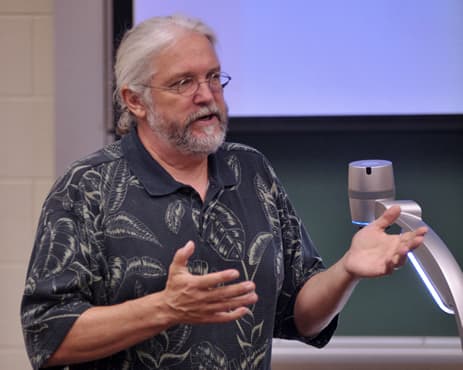
Jonathan Crane, associate professor in the Communication Studies Department, is one of five finalists for a prestigious UNC Charlotte honor – the Bank of America Award for Teaching Excellence. Prior to the official ceremony to name the award recipient, scheduled for Friday, Sept. 5, Inside UNC Charlotte will profile the other finalists: Fumie Kato, associate professor, languages and culture studies; Tracy Rock, associate professor, reading and elementary education; and Debra Smith, associate professor, Africana studies. Read more about the first finalist featured Anita Blowers, associate professor, criminal justice and criminology.
Crane arrived on campus in 1988 to help forge a new Communication Studies Department. At the time, communication studies was a minor in the English Department. Over time, and with the collaboration of a dedicated team of faculty, Crane played a significant role in transforming a collective dream into a thriving, award-winning department with a demanding undergraduate program that combines theory and praxis.
Crane served on almost every committee required to plan, hire faculty, assess and grow a program from a minor to a stand-alone department. As the graduate coordinator for the program from 2001-03, he was responsible for many of the curriculum choices and design still in place today. Now, as an associate professor in the department, he noted that some of the core faculty members for the film studies minor are students he taught and mentored as undergraduates.
Many agree that Crane has the ability to inspire his students. Communication Studies Department Chair Shawn Long stated, “I regularly receive unsolicited informal feedback in the streets and at graduation about how grateful students were to have Dr. Crane and how his lessons have served them well in their lives.”
A senior who has taken classes with Crane for three years attributes his enthusiasm for the study of mass media to courses taken with Crane. “Dr. Crane uses a very effective, unique teaching style…. His classes are challenging, but learning is mandatory in order to pass,” wrote the student.
Crane’s courses are rigorous and include topics in communication theory, film theory, public speaking, cultural studies and popular arts. Dynamic, absorbing lectures and free, open classroom exchange enable students to internalize ideas more readily, said Crane. His colleagues agree that his ability to unravel and articulate complex concepts for his student is a true gift. Fundamentally, Crane teaches students that symbols and communicative regimes shape a sense of self and structure engagement with multiple communities.
An affiliate faculty member in three programs, American studies, film studies and honors, Crane was interdisciplinary before interdisciplinarity was cool. His courses are often cross-listed with several campus programs, and Crane serves on various interdisciplinary feasibility committees.
According to Crane, “Love for the play of intellectual exchange is expressed and experienced through shared identification and fellow feeling.” The classroom offers a platform where students and faculty can “co-create and share intellectual sustenance.” He believes that when students and their instructor are fully engaged and united in a structured yet spontaneous analytic dialogue, the class as a whole experiences “flow.” It is this “flow” that Crane strives to achieve.
“Each time we communicate, a world of meaning is called into existence,” said Crane.